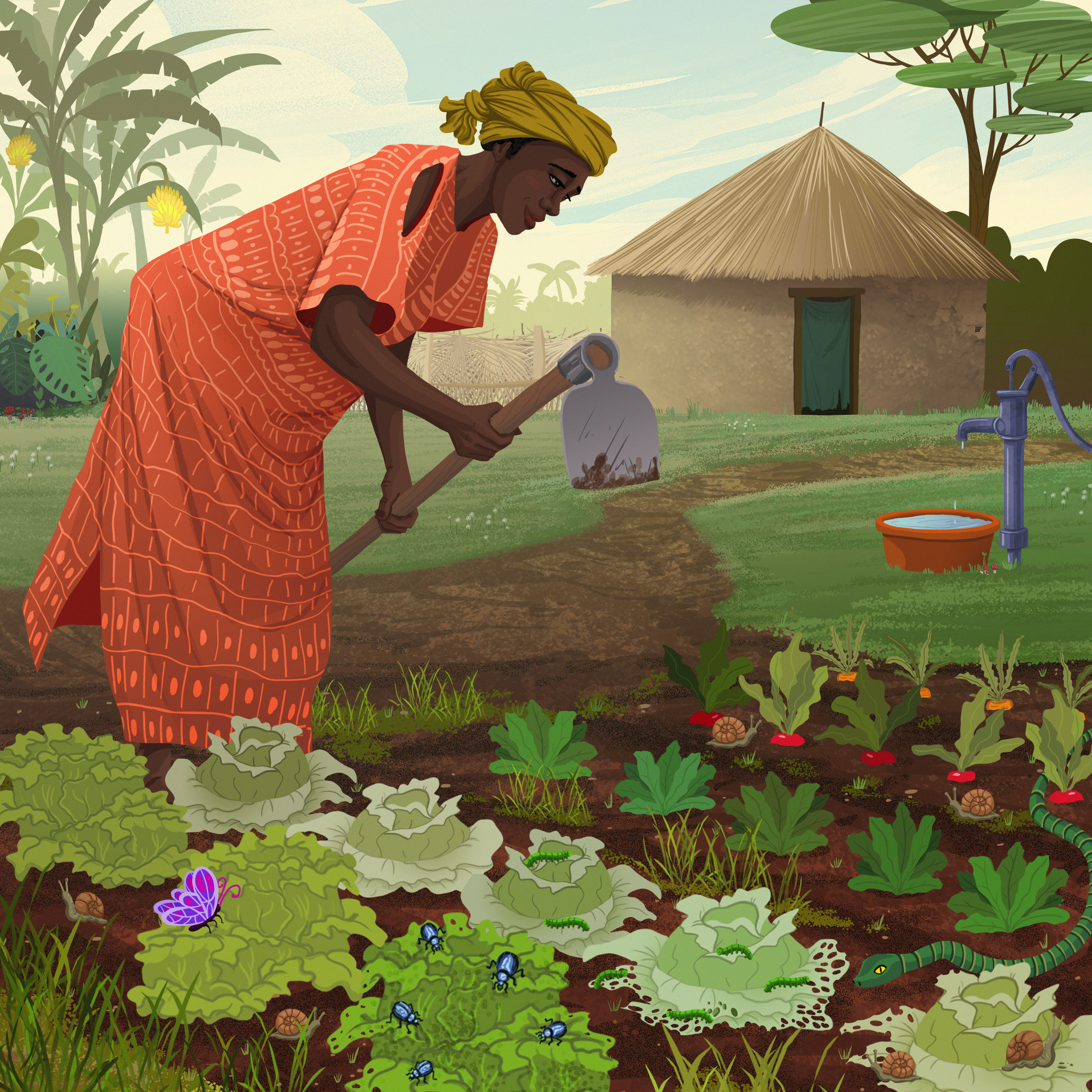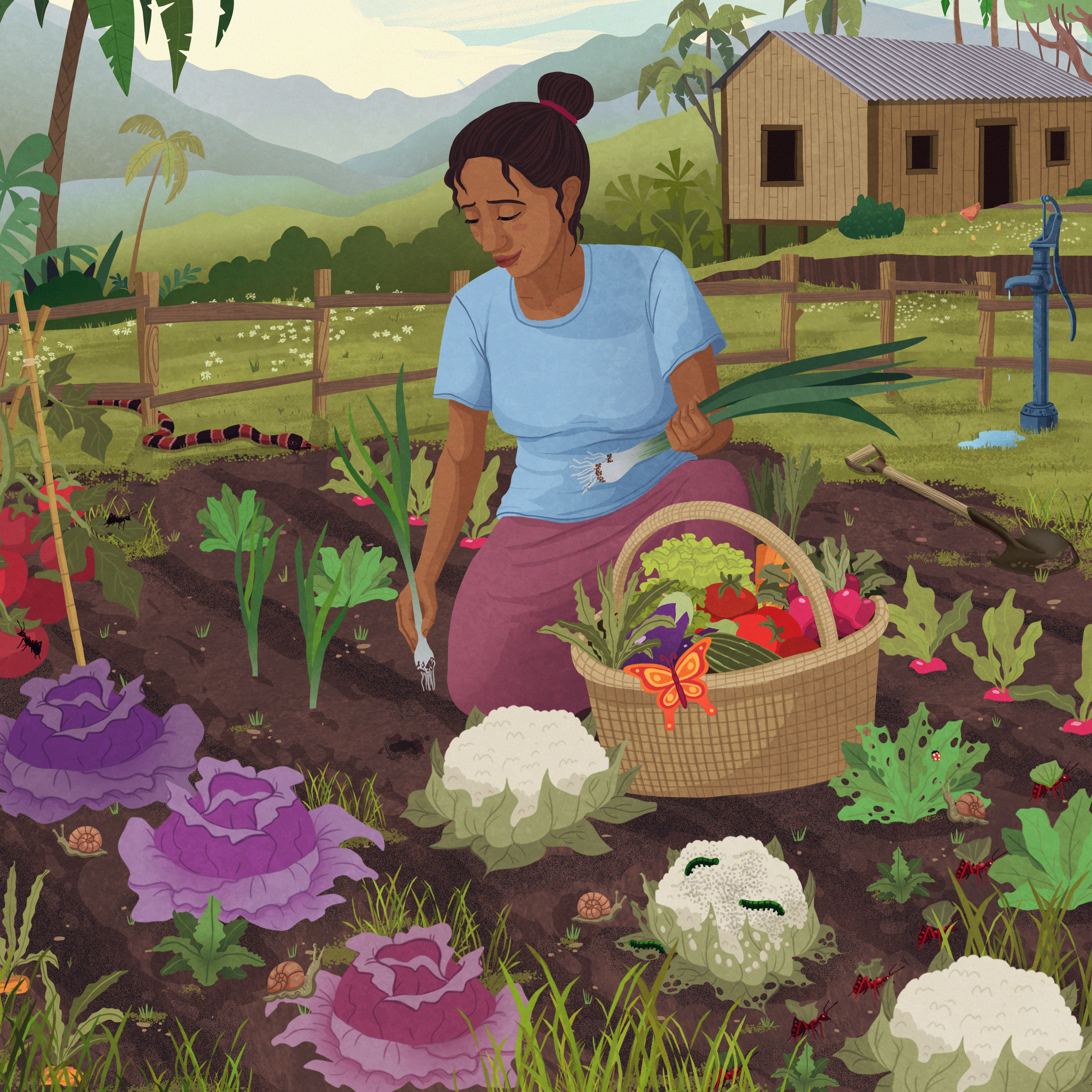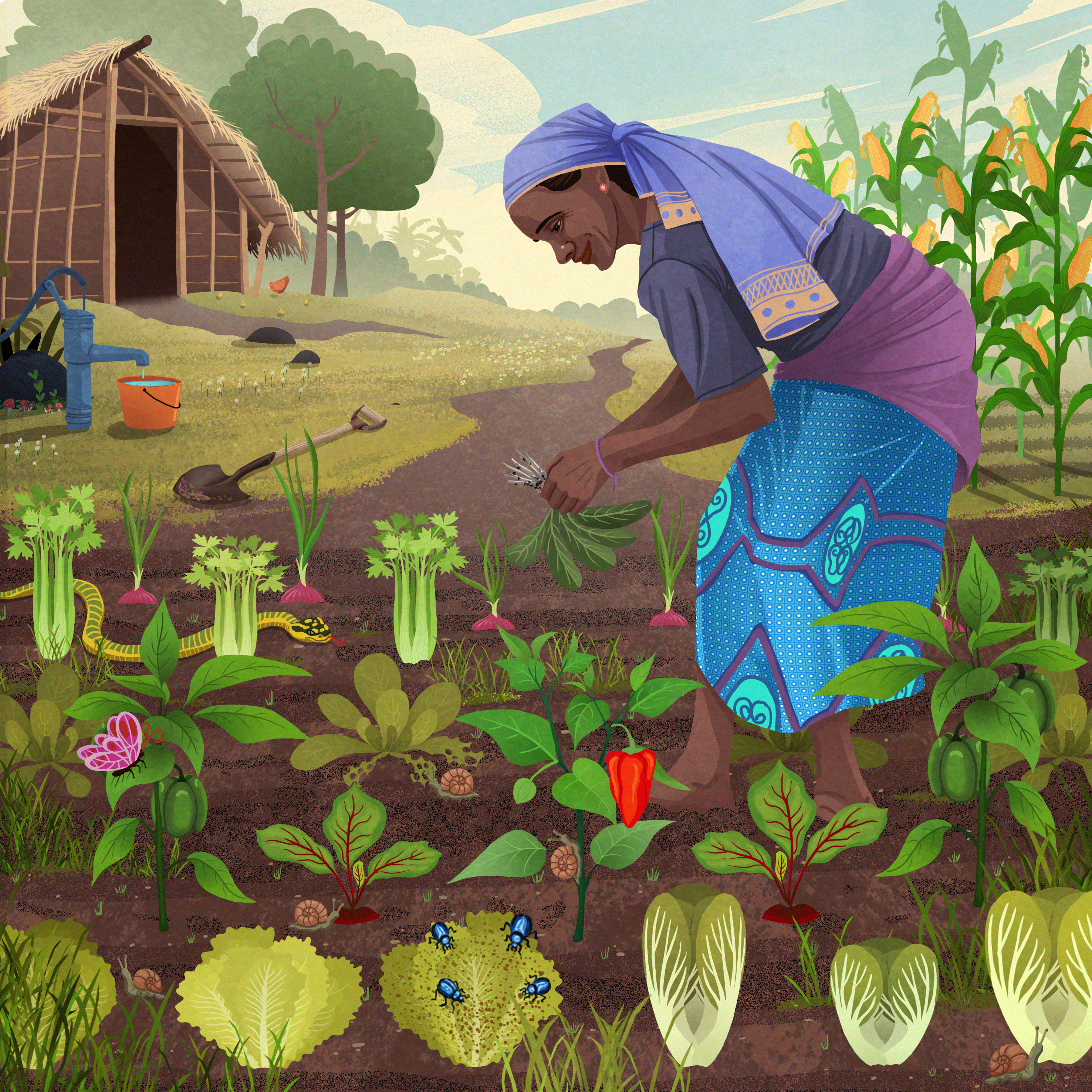Global Child Protection Parenting Curriculum
Year 2, Lesson 10: A Maintained and Healthy Garden: How to Recognize and Support Children in Trauma
Time Needed: 45 minutes
Garden Images:



Index
Teacher Preparation
Introduction
New Ideas
Caregiver Connection
Application/Activity
Reflection
Closing
Teacher Preparation
Objectives
The caregiver will be able to:
- Hear a Psalm about David’s struggle with suffering.
- Define trauma.
- List common trauma symptoms.
- Explain how unhealed trauma can lead to addiction and self-harm.
Materials
- Chalkboard and chalk
- Garden image
- Piece of cloth
Preparation
- Read the lesson and reflect on how to teach it wisely.
- Skim previous lesson. Prepare to have a quick review at the beginning of class.
Introduction
5 minutes
![]()
Last class we talked about caring for a child with special needs and explored the “do’s” and “don’ts” of parenting.
- What is one thing a parent with a special needs child should do? Accept answers. Possible answers: view child as valuable and worth protecting; choose safe friend or family member to help; choose one simple activity to do for yourself each day; find another special needs caregiver and meet to support each other; ask God for patience, wisdom and kindness; play a simple game or activity each day with child.
Healthy growth for any child occurs where there is love. Love desires only what is good for the other. Display the Garden image. This is a picture of a well-loved garden.
- How do we know this garden is loved? Accept answers. Possible answers: healthy, thriving plants, well-ordered and cultivated, colorful, lots of variety.
In this class, we have used the image of the garden to represent a child’s body, heart and mind. As caregivers, we have the privilege and responsibility to tend our children’s body, heart and mind well, so that they can grow into healthy, strong adults who make wise and loving choices.
- What are ways we care for our children’s body, heart and mind well? Accept answers. Possible answers include: provide nutritious food, shelter, good sleep, education; teach right and wrong; responsibility; loving discipline; listen; be safe person to express thoughts and feelings.
It is a challenge to parent our children in love. We don’t always make loving choices for our children. We cannot always protect them from the impact of evil in our world. We live in a world where the force of evil is working against the force of love.
Although God created the world in love, we no longer live in the perfect world he created. Our world is full of disappointment, disease, disaster, despair, and death. We all suffer from evil that is done to us and through us.
- What are ways we suffer from the impact of evil in our world? Accept answers. Possible answers: sickness, hunger, abuse, natural disaster, death, oppression.
- Consider a time of great suffering in your own life. Did you find it easy or difficult to see love? Accept answers.
Today we are going to talk about the effects that suffering has on our body, heart and mind.
In today’s lesson, we will:
- Hear a Psalm about David’s struggle with suffering.
- Define trauma.
- List common trauma symptoms.
- Explain how unhealed trauma can lead to addiction and self-harm.
New Ideas
15 minutes
![]()
Have you ever felt like evil is winning over good? Have you ever felt abandoned by God—like love is not present in your life? In today’s scripture, King David—the greatest king of Israel—expresses these exact feelings. We will be reading from Psalm 22. The book of Psalms is an ancient collection of songs, poems and prayers to God. Psalm 22 is a prayer David writes to God about his great suffering. David puts words to the way many of us experience suffering and how it effects our body, heart and mind.
Psalm 22:1-11
1 My God, my God, why have you deserted me?
Why do you seem so far away when I need you to save me?
Why do you seem so far away that you can’t hear my groans?
2 My God, I cry out in the daytime. But you don’t answer.
I cry out at night. But you don’t let me sleep.
In great suffering, David feels like God has abandoned him. Have you ever felt abandoned by God?
- What words would you use to describe David in this moment? Accept answers. Possible answers: hopeless, sleepless, distraught, sorrowful.
David has experienced the deliverance of God many times in his lifetime. He has known God’s love and care in the past. But in this moment, all he can see is his suffering.
- When we suffer, why can it be hard to see love? Accept answers. Possible answers: suffering is overwhelming to our bodies and minds; the shock of suffering can numb us.
David goes on to remind himself of God’s faithfulness and deliverance of his people in the past.
3 But you rule from your throne as the Holy One.
You are the God Israel praises.
4 Our people of long ago put their trust in you.
They trusted in you, and you saved them.
5 They cried out to you and were saved.
They trusted in you, and you didn’t let them down.
- When we suffer, why is it important to remind ourselves of God’s past faithfulness? Accept answers. Possible answers: turns us away from the suffering and towards God; gives hope in the midst of despair.
6 Everyone treats me like a worm and not a man.
They hate me and look down on me.
7 All those who see me laugh at me.
They shout at me and make fun of me.
They shake their heads at me.
8 They say, “He trusts in the Lord.
Let the Lord help him.
If the Lord is pleased with him,
let him save him.”
- What is causing his suffering? Accept answers. Possible answers: hatred of man; being mocked and abused; being looked down on by others.
Not only does David feel abandoned by God, he feels rejected and hated by the people around him. He feels alone. Suffering often makes us feel alone.
- How does feeling alone make suffering worse? Accept answers.
When we feel completely alone in our suffering, it is easy to become hopeless. We withdraw from the world and find no purpose or meaning to life. David does not stay in this place of hopelessness. He reminds himself of the truth of who God is. He reminds himself that not only has God been faithful to all his people; he has been faithful to David individually.
9 But you brought me out of my mother’s body.
You made me trust in you
even when I was at my mother’s breast.
10 From the time I was born, you took good care of me.
Ever since I came out of my mother’s body, you have been my God.
11 Don’t be far away from me.
Trouble is near,
and there is no one to help me.
- What are God’s true thoughts and feelings for David? Accept answers.
David reminds himself that God has known and loved him since birth. He cared for David since he was a baby. This reminder brings hope that God has not abandoned him and will help him in his need.
Every person experiences suffering in their life. Many times, suffering occurs because of a traumatic event.
- What are examples of traumatic events? Accept answers.
Traumatic events include living through a natural disaster, witnessing violence, facing the sudden death of someone close to us or experiencing any form of abuse: physical, verbal and sexual. When a child experiences such a distressing or disturbing event, they become traumatized, or emotionally shocked. It is as if a wall goes up in the child’s body, thoughts and feelings and they cannot easily feel or receive love.
Sometimes, we are aware that a traumatic event has happened to our child. But, especially in the case of abuse, sometimes we are unaware. However, there are common signs that a child is traumatized. These signs include:
- Sudden change of personality
- Nightmares or sleeplessness
- Severe anxiety
- Withdrawal from relationship
- Sudden aggressive behavior
- Bedwetting
- Decline in grades and performance at school
What if you have noticed some of these signs in your child? How do we know if a child is just very upset by something or if he has experienced trauma? Unlike normal stress, traumatic stress interferes with everyday life, affects the child’s ability to function and impacts their relationship with others.
Perhaps you or someone close to you has experienced trauma. Take a moment of silence to consider:
- How did it affect the ability to function in everyday life? How does it impact relationships with others?
Allow any willing participants to share from their own experience at this time. Due to the sensitive nature of this question, it is possible no one will want to share. If you have a personal experience with trauma, consider sharing your experience.
Caregiver Connection
5 minutes
![]()
When King David suffered, he poured out his heart to God, because he knew God was safe, trustworthy and good. David understood he wasn’t alone or unloved. He was able to tell God about his suffering and ask God for help.
We are made in God’s image. God made us to receive his love and give his love to others. As caregivers, we are meant to be a safe, trustworthy and good place for our children to go when they are suffering. In the presence of love, suffering finds a place to heal, and a reason to hope again.
Application/Activity
15 minutes
![]()
Often when a child experiences a terrible event, particularly when a child is abused by an adult, they do not tell anyone and the trauma remains hidden.
Every person who experiences trauma responds differently. But when a traumatic experience remains hidden, it cannot be healed. It remains inside of us and continues to bring us hurt and pain. It can make us believe that love isn’t real. We might even turn away from love and turn towards evil ourselves. This is because whatever we receive, we give back to ourselves and others. When we receive evil, we give evil. When we receive love, we give love.
Let’s play a game to explore this idea. Explain the game called, “This is not a…”
- Stand in a circle in the center of the room.
- Hold up a piece of cloth. Explain to participants that they will use their imaginations to transform the cloth into something else.
- As an example, make the cloth into a round, ball shape and say: “This is not a piece of cloth, this is my bright, yellow mango!” Act as if you are eating the mango.
- Ask participants to describe what you just did. Explain that each person will be given a turn to transform the cloth into something different. They will receive the cloth, transform it and say, “This is not a ____, this is ____.”
- Take any questions participants may have before starting the game.
- Pass the cloth to the person on your right and allow the cloth to go all the way around the circle.
-
In this game, did we all receive the same thing? Yes, a piece of cloth.
-
Did we all use the cloth in the same way? No. Everyone used it differently.
Whatever we receive is what we give. If we receive hurt and harm from another person, we give hurt and harm to ourselves and others. We might change it—just like in the game—and not give the exact same hurt and harm. For example, if we receive physical harm from someone, we might not hit another person, but instead bring hurt to ourselves or others in a different way. We might be mean to someone that is weaker than us, call people bad names, not allow someone to help us, form an addiction to alcohol or drugs, think badly about ourselves, treat others disrespectfully or hurt animals.
When a child has lived through a traumatic experience, like abuse by another person, they have received evil. But that doesn’t mean they are forever lost and trapped in evil’s power. There is another force in the world that is much more powerful than evil.
- Do you know what it is? Love.
God’s love is more powerful than evil. And God’s love is always present. So even if our child has received evil, they can always turn to love and receive from love too. Love brings healing to evil’s destructive ways. Love restores us to health and joy and hope.
Reflection
4 minutes
![]()
What do we have to do to receive God’s love? We can simply invite God’s presence to be with us.
Let’s take a moment to do that right now. Invite God’s love to come into the room. Remember, God only desires what is good for us and for our children. God wants to bring healing to evil’s destructive ways. In this moment of silence, ask God:
What does it look like when your love brings healing to a trauma?
Offer the caregivers a minute of silence and then allow willing participants to share what they heard.
Closing
1 minute
![]()
We are not alone in loving our children. God loves our children. He desires only what is good for them. He is grieved when our children suffer. When we invite God’s love to come in, he helps us bring healing to any evil that has been done. He guides us through even the toughest situation. He provides hope and restores joy.
![]()